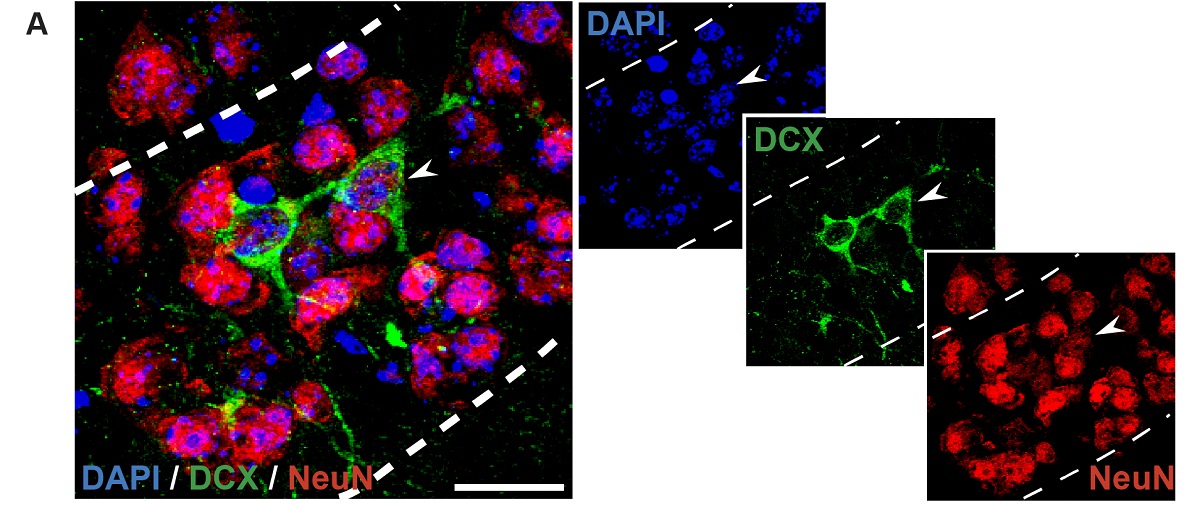
A research team from the Universitat de València analysed in mice the maturation process of a population of neurons that are generated during embryonic development and remain in an immature state in the olfactory cortex, maturing and inserting into the neural circuit as the animal ages. Previously, the team had shown that the maturation of this population was delayed by stress during childhood and by the lack of the Mecp2 gene, mutations of which cause Rett syndrome.
Now, the team identifies adolescence as a key period in the maturation of this population, but reports that motherhood does not affect the number of these neurons. The work – in which the Universitat Jaume I de Castelló also participates – has been published in the journal Brain Structure & Function.
The brain is one of the organs with the longest maturation process in the body. In many mammals, from rodents to primates, there are neurons that are generated during embryonic development but do not acquire mature characteristics until adulthood. These neurons are also present in humans, according to previous research by other research groups at the University of Valencia.
“In previous studies, we found that both exposure to stressful conditions during childhood in healthy mice and deficiency in the Mecp2 gene in genetically modified mice, a model of Rett syndrome, led to an increased number of these immature neurons compared to their unmanipulated controls. This means that the neurons were not maturing at the same rate as in control animals. In this work, we asked ourselves whether two periods of heightened neural plasticity, namely the transition to adulthood and to motherhood, might influence this population”, explains Carmen Agustín-Pavón, coordinator of the study and lectuer in the Department of Cell Biology, Functional Biology and Physical Anthropology at the Faculty of Biological Sciences.
“Our results confirm that the transition to adulthood is key in the maturation of these neurons but, contrary to our expectations, motherhood does not seem to significantly affect their rate of maturation”, says Rafael Esteve Pérez, predoctoral researcher at the same department and first co-author of the article.
The next step, as Agustín-Pavón points out, “is to continue characterising the process of prolonged neuronal maturation, analysing which factors influence it, because understanding these could suggest new ways to promote this process in developmental disorders that cause neuronal immaturity and in which plasticity mechanisms do not function correctly”.
The study was co-led by Jose V. Torres Pérez, Ramón y Cajal researcher from the Department of Cell Biology, Functional Biology and Physical Anthropology, and included the first co-authorship of Maria Abellán Álvaro, currently affiliated with the Universitat Jaume I and the CEU Cardenal Herrera University, as well as researchers from the Universitat Jaume I de Castelló.
This work receieved funding from the Spanish Ministry of Science and Innovation (PID2019-107322GB-C21/C22/MCIN/AEI; RYC2021-034012-I; MS21-083), the Department of Education, Universities and Employment of the Valencian Government (CIAICO/2023/027; CIGE/2022/139; CIACIF/2022/387) and the British Pharmacological Society (Pickford Award 2023).
Article reference: Esteve-Pérez, R., Abellán-Álvaro, M., Navarro-Moreno, C. et al. The density of doublecortin cells in the piriform cortex is affected by transition to adulthood but not first pregnancy in mice. Brain Struct Funct 230, 94 (2025). https://doi.org/10.1007/s00429-025-02957-x
Annex photo caption:
- Figure: Photomicrograph showing immature neurons expressing the immature neuron marker protein doublecortin (DCX) and the mature neuron marker protein NeuN in the olfactory cerebral cortex of a Mecp2-deficient mouse.















